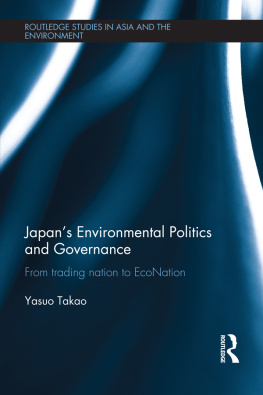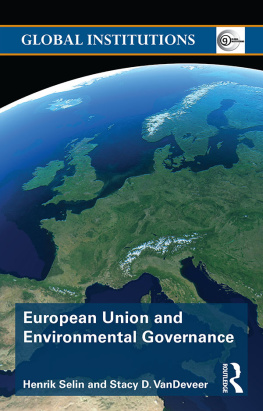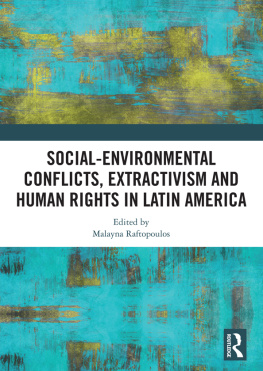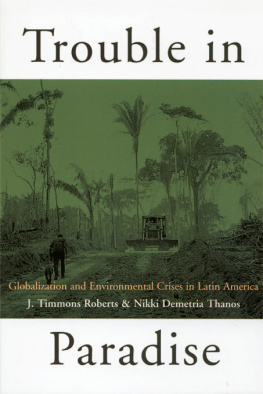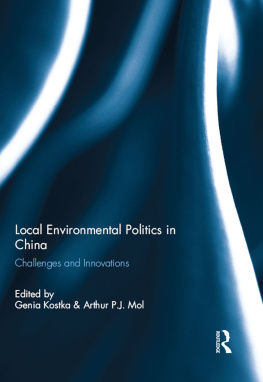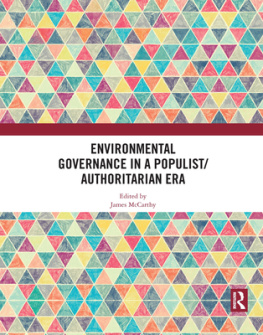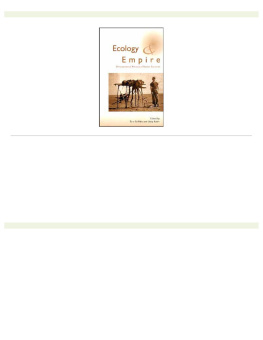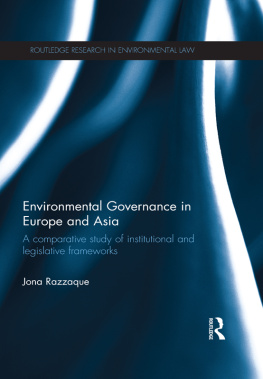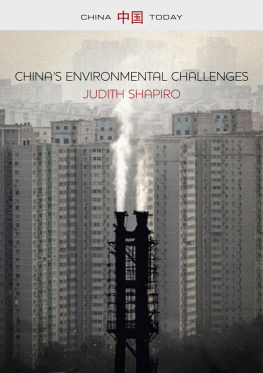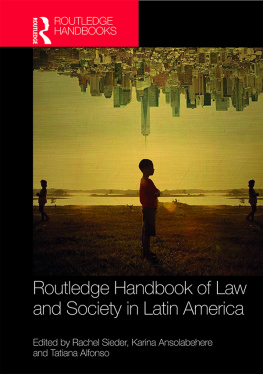Baud Michiel - Environmental Governance in Latin America
Here you can read online Baud Michiel - Environmental Governance in Latin America full text of the book (entire story) in english for free. Download pdf and epub, get meaning, cover and reviews about this ebook. City: London, year: 2016, publisher: Palgrave Macmillan, genre: Politics. Description of the work, (preface) as well as reviews are available. Best literature library LitArk.com created for fans of good reading and offers a wide selection of genres:
Romance novel
Science fiction
Adventure
Detective
Science
History
Home and family
Prose
Art
Politics
Computer
Non-fiction
Religion
Business
Children
Humor
Choose a favorite category and find really read worthwhile books. Enjoy immersion in the world of imagination, feel the emotions of the characters or learn something new for yourself, make an fascinating discovery.
- Book:Environmental Governance in Latin America
- Author:
- Publisher:Palgrave Macmillan
- Genre:
- Year:2016
- City:London
- Rating:3 / 5
- Favourites:Add to favourites
- Your mark:
- 60
- 1
- 2
- 3
- 4
- 5
Environmental Governance in Latin America: summary, description and annotation
We offer to read an annotation, description, summary or preface (depends on what the author of the book "Environmental Governance in Latin America" wrote himself). If you haven't found the necessary information about the book — write in the comments, we will try to find it.
Environmental Governance in Latin America — read online for free the complete book (whole text) full work
Below is the text of the book, divided by pages. System saving the place of the last page read, allows you to conveniently read the book "Environmental Governance in Latin America" online for free, without having to search again every time where you left off. Put a bookmark, and you can go to the page where you finished reading at any time.
Font size:
Interval:
Bookmark:
Environmental Governance in Latin America
Environmental Governance in Latin America
Edited by
Fbio de Castro
Barbara Hogenboom
Michiel Baud


Selection, introduction and editorial matter Fbio de Castro, Barbara Hogenboom and Michiel Baud 2016
Individual chapters Respective authors 2016
Afterword Eduardo Silva 2016
The authors have asserted their rights to be identified as the authors of this work in accordance with the Copyright, Designs and Patents Act 1988.
Open access:

Except where otherwise noted, this work is licensed under a Creative Commons Attribution 3.0 Unported License. To view a copy of this license, visit http://creativecommons.org/licenses/by/3.0/
First published 2016 by
PALGRAVE MACMILLAN
Palgrave Macmillan in the UK is an imprint of Macmillan Publishers Limited, registered in England, company number 785998, of Houndmills, Basingstoke, Hampshire RG21 6XS.
Palgrave Macmillan in the US is a division of St Martins Press LLC,
175 Fifth Avenue, New York, NY 10010.
Palgrave Macmillan is the global academic imprint of the above companies and has companies and representatives throughout the world.
Palgrave and Macmillan are registered trademarks in the United States, the United Kingdom, Europe and other countries.
DOI 10.1057/9781137505729
E-PDF ISBN 9781137505729
E-PUB ISBN 9781137505736
Hardback ISBN 9781137505712
Paperback ISBN 9781137574084
A catalogue record for this book is available from the British Library.
A catalog record for this book is available from the Library of Congress.
Contents
Fbio de Castro, Barbara Hogenboom and Michiel Baud
Joan Martinez-Alier, Michiel Baud and Hctor Sejenovich
Joan Martinez-Alier and Mariana Walter
Mina Kleiche-Dray and Roland Waast
Pablo Andrade A.
Benedicte Bull and Mariel Aguilar-Sten
Cristin Parker, Gloria Baigorrotegui and Fernando Estenssoro
Hctor Sejenovich
Mariel Aguilar-Sten, Fabiano Toni and Cecilie Hirsch
Leticia Merino
David Barkin and Blanca Lemus
Mariana Walter and Leire Urkidi
Eduardo Silva
Figures and Tables
Figures
Tables
Preface
This book is the result of the collaborative research project Environmental Governance in Latin America (ENGOV) funded by the European Union (EU). For four years, a team of experts from ten Latin American and European academic institutions investigated how environmental governance is currently being shaped in Latin America. In this joint effort, we were driven by our concerns about widespread ecological degradation, poverty and injustice, as well as by our curiosity about the ways in which the emergence of new political regimes and elites, and innovative steps by communities and social organizations, affects governance practices and naturesociety relations. To understand the possibilities and obstacles for sustainable and equitable natural resource use, a range of case-studies were carried out in Argentina, Chile, Uruguay, Brazil, Bolivia, Peru, Ecuador, Colombia, El Salvador, Costa Rica, Nicaragua, Guatemala and Mexico. Although some of the research topics and cases are not included in this volume, their findings have contributed to the discussions and theoretical reflections in the overall analysis.
The ENGOV project has been simultaneously challenging and inspiring. The theme of environmental governance is a huge academic enterprise because it addresses complex social relations, practices and views influencing how societies perceive nature and use natural resources. Combining methods and theories from different fields of the social sciences is a prerequisite which in practice is fairly demanding. Furthermore, by encompassing political, economic, cultural and environmental changes, formal as well as informal arrangements, and cross-scale connections, the study of environmental governance can easily become a mission impossible. Arguably this is even more the case for contemporary Latin America, with its variety of local and national conditions facing rapid-paced changes. Finally, collaborating in an international research consortium of ten institutional partners and more than 25 researchers from different disciplines, schools of thought and generations has also proved to be both daring and rewarding. The fact that we spoke in different academic languages and idiom accents was not only a hurdle to tackle during our group discussions, but also forced us to learn from each others approaches and convictions, and the foundations on which these are based. As a typical governance process, next to misunderstandings, dissonances and unbridgeable differences, the exchange of different insights and perspectives proved to bring about refreshing debates and new understandings, nuances and agreements.
Without the ambition to provide a full overview of the environmental governance in Latin America, we have tried to identify key fields for research, with an emphasis on new trends or structural problems that deserve more academic attention. The new insights from each piece of research contributed to the development of analytical frameworks to analyse the multiple interconnected processes shaping environmental governance in the region. This volume is the result of this intricate, collaborative exercise.
For the realization of this book, several people and institutions have been indispensable. It would not have been possible without the extensive support of the EU. Financed under the Seventh Framework Programme, ENGOV enabled the consortium to develop important new research on environmental governance in Latin America and the Caribbean, resulting in a long list of publications. We are particularly thankful for the professional guidance of Philippe Keraudren and Cristina Marcuzzo of the Social Sciences and Humanities division of the Research and Innovation Directorate General.
We would also like to thank the institutions participating in ENGOV for their financial and administrative support, including their directors and the employees who directly assisted the project: Consejo Latinoamericano de Ciencias Sociales (CLACSO), Institut de Cincia i Tecnologa Ambientals, Universitat Autnoma de Barcelona (ICTA-UAB), Institute de Recherche pour le Dveloppement (IRD), Centre for Development and the Environment, University of Oslo (SUM-UiO), Centro de Desenvolvimento Sustentvel, Universidade de Braslia (CDS-UnB), Universidad Autnoma Metropolitana, Unidad Xochimilco (UAM-Xoc), Instituto de Estudios Avanzados, Universidad de Santiago de Chile (IDEA-USACH), Instituto de Investigaciones Gino Germani (IIGG) and Universidad Andina Simn Bolvar, Sede Quito (UASB-SQ). We are grateful to our colleagues from CLACSO, and in particular to Fernanda Saforcada and Guadalupe Rudy, for their continuous support during the project. We also thank the University of Amsterdam, which hosts our own Centre for Latin American Research and Documentation (CEDLA) and was very supportive of ENGOV, in particular Jan Jacob Sikkema and Bea Krenn. At CEDLA, the solid project support by Leontien Cremers requires a special mention. Her accurate and cheerful involvement, including the preparation of the Index of this volume, has made a difference both for CEDLAs ENGOV coordination team and for all the consortium members. We would also like to thank Mara Barrachina for kindly granting permission to use her photograph on the front cover. We are also most grateful to the members of ENGOVs international advisory board, who have offered insightful comments on the draft chapters: Anthony Bebbington (Clark University and University of Manchester), Alberto Cimadamore (University of Bergen), Edward F. Fischer (Vanderbilt University), Barbara Gbel (Ibero-Amerikanisches Institut), Leticia Merino Prez (Universidad Nacional Autnoma de Mxico), Pedro Roberto Jacobi (Universidade de So Paulo) and Eduardo Silva (Tulane University). In addition, we are grateful to all the scholars and students who have contributed to the discussions at different ENGOV meetings.
Next pageFont size:
Interval:
Bookmark:
Similar books «Environmental Governance in Latin America»
Look at similar books to Environmental Governance in Latin America. We have selected literature similar in name and meaning in the hope of providing readers with more options to find new, interesting, not yet read works.
Discussion, reviews of the book Environmental Governance in Latin America and just readers' own opinions. Leave your comments, write what you think about the work, its meaning or the main characters. Specify what exactly you liked and what you didn't like, and why you think so.



